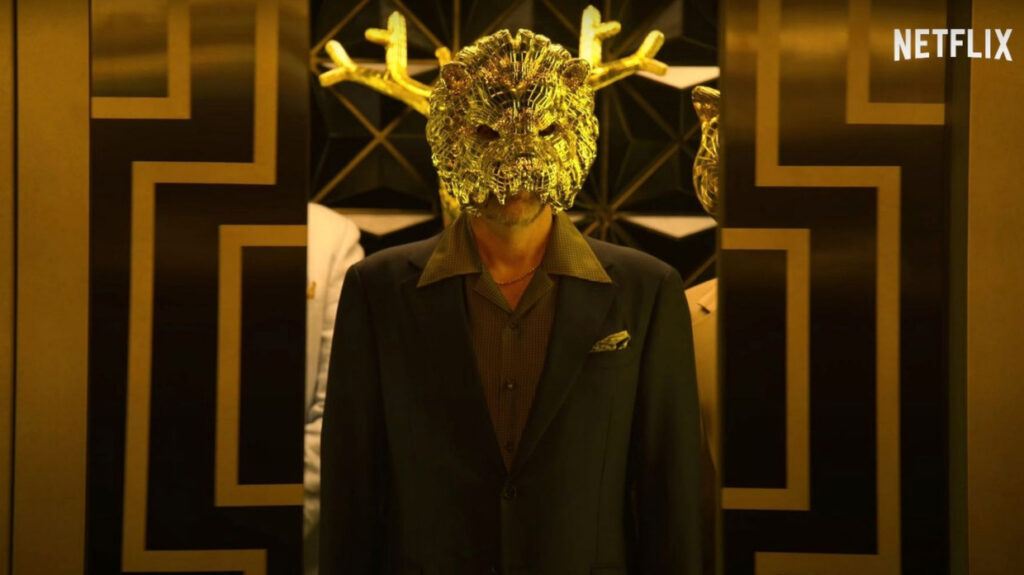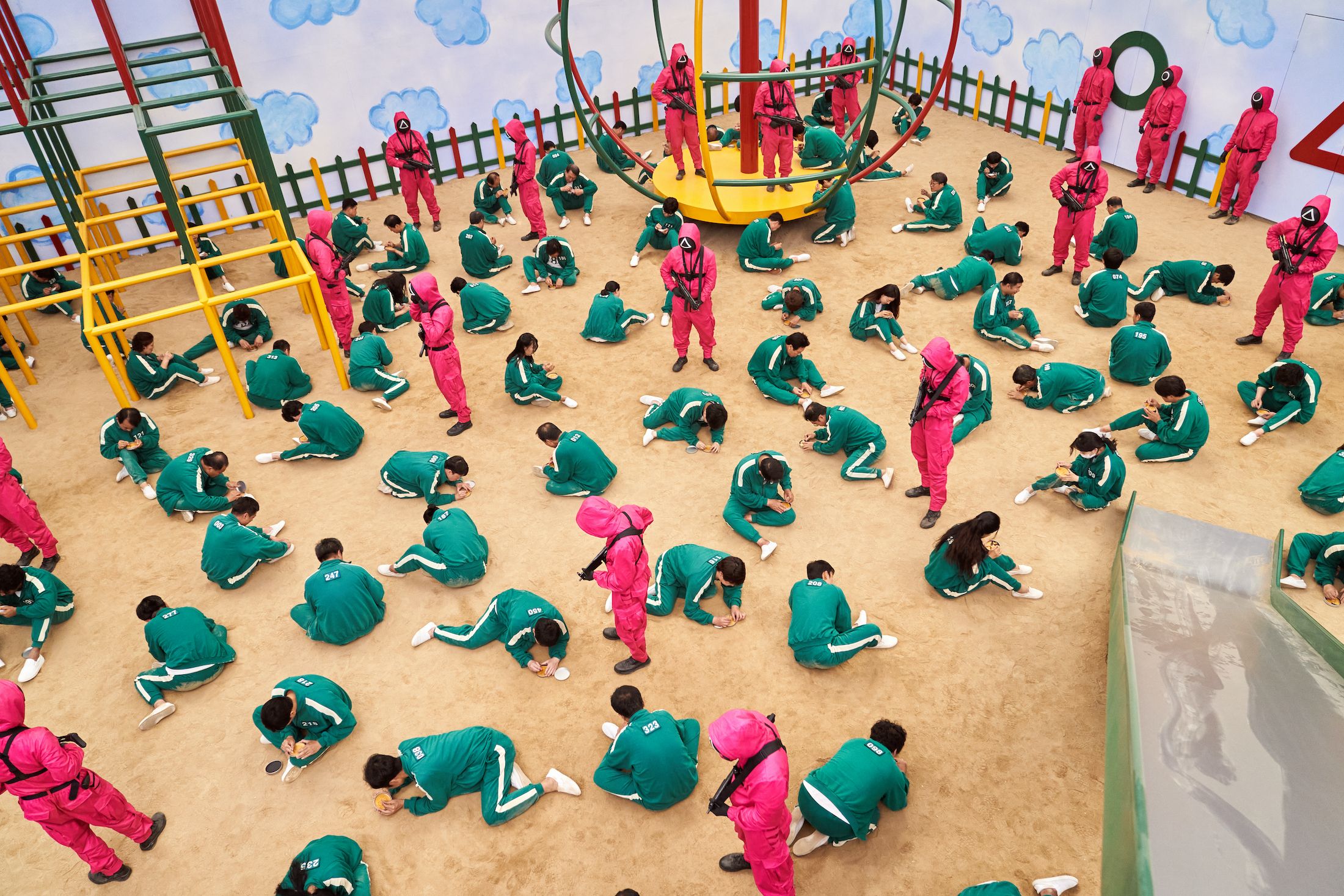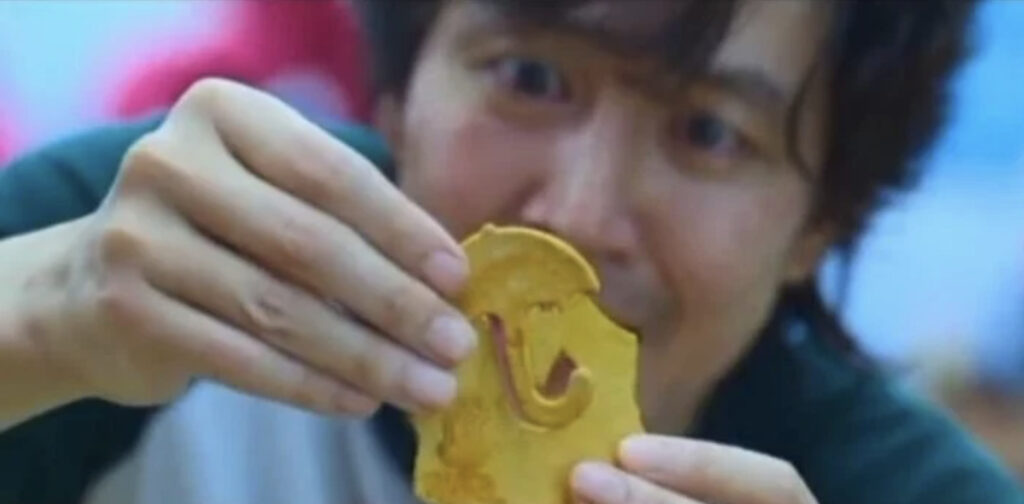It is now clear that Squid Game will most likely become Netflix’s single most watched show in any language, including English. Why? The show is a modern Hunger Games/Battle Royale sort of experience that is ultra violent, and incredibly dark. But why? Why would such a violently dark show become such a huge global phenomenon? The answer is pretty simple actually… it is a truly simple ethical morality tale. It scratches a deep deep itch for righteousness, goodness, and rightness to prevail in the face of horrific life experiences. We all have this deep-seeded need to know that our life has purpose, and meaning, and that the injustices we see all around us will not prevail. We are desperate to see evil fall, and goodness triumph. It doesn’t seem possible though, not in the real world anyway. So to find a dystopian horror story about down and out losers playing a game and still rooting for goodness? It’s perfect. It really is a perfect show. But even after having watched it, it might not be clear as to what this show is all about, and what it is trying to do. So let’s walk through it together and see what we can discover together.
Okay, so this is how this conversation is going to go… let’s do a quick, one paragraph highlight of the episode’s events. Then I will talk through the interesting bits of that episode. And at the end we’ll sum up the interesting arcs and insights throughout the entire show. Alright?

Episode 1 – Red-Light/Green-Light – Seong Gi-hun (played perfectly by Lee Jung-jae) is a father who is truly down on his luck. He’s racked up enormous debts to loan sharks and shady characters determined to cut him up and sell his body parts for payment against his debts. After losing a game of ddakji he is given a card that invites him to play a game with much higher stakes. He ultimately accepts, is collected, and delivered to a mysterious island with 455 other players all in the same down and out state. Everyone here in the game is named by their number in the game… and they are all dormed together in a single enormous room. The game is managed by many masked men who are anonymous to even themselves… and ultimately by a Front Man who is also anonymized by a mask. There is a single pot of money that is up for grabs. The less people that remain in the game, the more the prize money increases for each remaining player. The goal? Survive 6 days, and 6 games. And in the process, Gi-hun befriends 001, an elderly man. Also, Gi-hun befriends an old classmate who became a successful businessman. They are a cast of misfits. But they band together to help each other after surviving an ultra-violent game of red-light green-light that ends with moving players getting gunned down.
Thoughts on Episode 1 – Look at who our heroes are in episode one. A business man. A down and out dad. A female pickpocket (my personal favorite character, played by Jung Ho-yeon). An old man. A clueless alien Pakistani (Ali, played by Anupam Tripathi). This is basically the bad news bears of the Battle Royale underworld. But they all prove to be kind, and thoughtful, in spite of the chaos going on all around them. On the other side of the fence, are your stereotypical bad guys, ex-gang members, cut throats, and heavies, with all the strength and muscle to win this game without much effort. It’s as if you had stacked a game of survivor to lose as unevenly as possible. There’s no way that Seong Gi-hun or his friends are going to survive the day, let alone the entire game. (Are you sensing a Rocky theme here yet? Because it is, it’s Rocky for the dystopian world.)
Episode 2 – Hell – In the very first game, more than half of all the 455 players were murdered by the game. It set the extraordinarily violent tone for the rest of the game… and the game will not disappoint on that front. When the players realize what they’d done by joining, they beg to leave. And, because of the third legal clause, if a majority of people in the game chooses to leave, they are all allowed to go. Player 001’s deciding vote allows them all to return home. Gi-hun attempts to tell the police what happened, but no one believes him. Except for Detective Hwang Jun-ho, who’s brother went missing, and the detective found a similar calling card. When the game organizers give the players another chance to rejoin, almost all of them choose to come back. Why? Because all these characters are in horrible situations. Gi-hun’s mother desperately needs surgery. 67 needs to smuggle her mother out of North Korea. 001 seems to have nothing to live for. The business man is about to be arrested for fraud. They have nothing to live for. And when Gi-hun is picked up again, the detective secretly follows him back into the game.
Thoughts on Episode 2 – This step is a clever ploy to indict each player, and remove the, “I didn’t know what I was getting into” excuse. They just watched half the players get gunned down and still they returned. But when reminded of the horrors of life, and the impossible situations surrounding them, they almost all choose to come back to the game. They are now culpable. Every single player has admitted their life is forfeit.
Episode 3 – The Man With the Umbrella – The detective, Jun-ho, secrets himself in among the masked staff, and begins his ill-fated search for his brother. The players, returned to their dorms, begin strategizing, and planning for the next deadly game coming their way. Gi-hun, Sang-woo, 001, and 199 all team up, as they realize that almost everyone is back, including the first player to beg to leave. The second game? What is it? The players are given dalgonas, that they are to pick the shape out of. If they snap, or break the shape, they are immediately shot. Now, we have to say, that Sang-woo knew the game that was coming… but he did not warn his teammates. Hrmmmm. For a nice guy… that’s a pretty evil trick. Gi-hun, stuck with the worst shape, an umbrella, is desperate to survive. Eventually, he realizes that licking his honeycomb, it’ll melt and dissolve it from the back to front. In the scrum and chaos of people dying and winning, a staff member is taken hostage. The player ultimately kills himself, but after the staff member was convinced to remove his mask, the front man kills him for revealing his identity. So, apparently, anonymity is critical here in this world? Afterwards, Jun-ho takes the square mask, effectively moving up a rank among the staff members.
Thoughts on Episode 3 – I have a theory about movie morality that is so thoroughly baked that I started writing a book about it. I kid you not. But I’m lazy. And just haven’t finished it yet. But basically, the chassis of movie ethics rides on the idea of justice. We all love characters that aren’t necessarily good, but are fair, just, and treat others as you would like to be treated. As you watch from here on out, pay attention to who lives, and who dies, and their back story, or what they do in the game. If a player backstabs another player. If a player cheats. If a player is unfair. They won’t make it to the end. And here we start to see some foreshadowing of that beginning with Sang-woo’s uncool move with his teammates. Pay attention, I promise you I am right. You can always determine who will win and who will lose in advance by the player’s actions in the game.

Episode 4 – Stick to the Team – A player that also happens to be a doctor, Player 111, starts getting fed information as to what the games will be in advance, in exchange for help pulling the organs from dead players, so that the staff can sell the organs on the black market. And using this information he joins Deok-su’s team… Deok-su is the gangster player with the snake tattooed on his face. I suck at names, and had the hardest time collecting all the numbers and player names. Gah. Anyway. Deok-su realizes that the staff isn’t going to stop him from murdering other players in cold blood, and in fact, they are rewarded for their deceit by getting a growing share of the money. That night, after the lights go out, a war erupts among the players as they strive to murder all the other players in the game. Eventually, player 001 begs everyone to stop (which is interesting, if you’ve seen the show through to the end) and they do. In the third game, the teams are told to form groups of ten, and they play a game of tug of war to the death. Gi-hun’s team only survives the challenge by using superior teamwork and coordination. (Specific stances, methods, and ultimately three quick steps forward.)
Thoughts on Episode 4 – There is an ongoing theme of weak verses strong throughout the games and the way the teams coalesce and form. Sang-woo is already attempting to remove women from the group. Deok-su kicks Han Mi-nyeo out of the group knowing that it’s a game of tug of war. She goes over to Gi-hun’s team and increases the bad news bears flavor of Gi-hun’s team. Making it all but certain that Gi-hun and company will lose. Which leads me to question, how much does this happen in the corporate world, and in real life. Sure, when lives are on the line, and it’s a barbell challenge… okay. But even so, is that moral? Ethical? These games just are showing the incredible gender and sexist motivations that happens in the world today. But not only gender discrimination, but also ageism. We’ve already begun to see how the corporate world rages against the poor and the downtrodden. But in the game, the tyranny continues against women, the weak, the old. It seems to be everywhere.

Episode 5 – A Fair World – surviving the round of tug o’ war was jolting. Watching players get dragged off the ledge only to fall to their death has to have been a horrifying experience. That night, Gi-hun and company build bunkers to protect themselves from the assumed attack, like what happened the previous night. Inside the walls of the leadership, Jun-ho learns about the black market effort to harvest organs from the dead. But when the Front Man catches the group, he executes the doctor and the staff that were a part of the conspiracy. And the game leaders apologize to the remaining players for giving player 111 an unfair advantage, but that from here on out it would be “fair.” Realizing that there is an infiltrator in their midst, the Front Man begins hunting for Jun-ho. And when Jun-ho finds the Front Man’s office, he learns that the game has been running for over 30 years, and that his brother, Hwang In-ho, won back in 2015.
Thoughts on Episode 5 – Personally? I don’t know if I could live with myself after that tug of war game. You literally, and personally, just dragged a person to their death. Red-Light/Green-Light, the players were murdered by a maniacal robot. In the honeycomb cookie challenge, masked men with guns were the murderers. But this one? You did it. You basically shoved a person off a cliff. NO! Not A person… a pile of persons… basically a dozen persons. And it would be a very painful death. You don’t immediately die falling… I mean you could… but generally, a fall like that? It’d be atrocious. (I once took a header off my roof – it was a whole thing with Christmas lights and ice on the roof.) But can you imagine murdering ten people in a game of tug of war?
Episode 6 – Gganbu – Our favorite (ill-fated) cop, watched the Front Man as he takes a call talking about how the chaos of the recent few days would be settled by the time that the VIPs arrive. (VIPs?) Then for the fourth game, there is a conundrum. All the players are told to pair up. Do you need speed? Strength? Intelligence? It’s like middle school picking nightmares but where lives are on the line and no one is in the mood to pick the slow kid. When the game begins, the players are told to play a marble game of their choosing. But whoever ends up with their partner’s marbles? Wins. And the other person dies. A few key things happen… Sang-woo embezzles all of Ali’s marbles in a really evil way. (Can you say, persona non grata?) And Gi-hun realizes that 001’s brain tumor is acting up, and begins cheating to turn the tide. 001 informs Gi-hun he knows he has been cheating, but allows Gi-hun to win anyway.
Thoughts on Episode 6 – The flip from partners to enemies? Brutal. Cunningly brutal. This is the first episode where our beloved inner-circle of friends has been culled from. And it was rough. Wasn’t it? Ali’s death? Horrific. 001?? Really cut. But the worst… the absolute worst, was the competition between Sae-byeok and Player 240, Ji-yeong. The two women of our troop. They spend their 30 minutes after deciding to play one round of an all or nothing game. But after talking together through their last 30 minutes together they learn a lot about each other. Ji-yeong’s father, it turns out, murdered her mother, and in turn, she murdered her father. But when it comes to the competition, Ji-yeong throws the match, and allows Sae-byeok to win. It’s a gut-wrenching segment.
Episode 7 – VIPS – We learn that Mi-nyeo survived the game simply by not having a partner. And conversely, we learned that the husband and wife duo that played the marble game together, and resulted in the husband surviving, caused the husband such despair, he committed suicide afterwards. But the big news of the episode is that the VIPs arrive. They apparently watch the games and gamble on their outcomes. One of the VIPs hits on Jun-ho, and attempts to have sex with him, but Jun-ho murders him instead. Jun-ho steals scuba equipment and flees. Which brings us to the fifth game. The group individually selects their order in the next game. And then they are required to cross a bridge made of tempered and normal glass panes. The odds of successfully guessing every single pane? 2 to the power of 15… 32,768. Which basically means, a lot of people are about to die. At the end, we are left with Gi-hun, Sang-woo and Sae-byeok.
Thoughts on Episode 7 – A lot happened as this show barreled ahead. Our evil gangster, bad guy, gets to the front of the line, and he refuses to move. Deok-su is then grabbed by Sang-woo, and they both fall to their death together. To her credit, she promised to be the one to kill him, and she did just that. But it was Sang-woo’s pushing of player 017 that really sent me over the edge, and completed his fall from grace. Sang-woo is now our new Deok-su… only he is worse in that he was a neighbor and friend of Gi-hun. But he has bitten the apple, and completely wandered off reservation. What is it about a good person turned bad that bites deeper than a bad person being consistent? Is this a Judas sort of gut punch??
Episode 8 – Frontman – The trio are given formal dinner wear and a celebratory dinner so much like the show Survivor, that I did a double-take. But the twist was that all three are left with their steak knives. In the past, this sort of move by the game was an invitation to murder other players. Sometimes it was clear that that would not be acceptable. But right now? It’s a nod to the three remaining players… have at it. And true to form… Sang-woo knifed Sae-byeok in the neck. It largely is immaterial that Sae-byeok was badly wounded from the bridge challenge. He killed her to prevent Gi-hun from teaming up with her against him. It was a gutless play, a horrible, terrible move. Regardless, Jun-ho crosses to another island, and contacts his police chief, but isn’t able to get good enough cell to send the attachments. Front man and the soldiers hunt down Jun-ho, and Front Man reveals that he is Jun-ho’s brother. The brother that he has been searching for, and came to the island to find. And as the episode ends, In-ho shoots Jun-ho and lets him fall into the ocean. (Did he survive?)
Thoughts on Episode 8 – The show is a discourse on the corrupting and perverting power of money in the world. That it is cash, specifically, that creates a large swath of the world’s inequality across the globe. That the rich objectively abuse the poor without fail. (Doubt me? Read about the Panama Papers). So much so, that it pits brother against brother. Jun-ho, and In-ho, literally pull a Cain and Abel as In-ho murders his brother. If you weren’t paying attention, this move by In-ho probably was confusing. But if you have been watching, and seeing what is happening across the story, you weren’t surprised, right? Similarly, Sang-woo murdering Sae-byeok, same story. Money. Power. All drive wanton blood-lust.
Episode 9 – One Lucky Day – The Squid Game. Gi-hun and Sang-woo setup to play a single round… or to the death. And when Gi-hun wins, and refuses to touch home base in order to attempt to save his old neighborhood friend’s life. He invokes the third clause, to quit the game.
Now Pause a second… I watched this show with my daughter – and after episode 3, we had a bet. I posed a question to her. “Anica, do you think there will be a single winner? Or, do you think that the remaining players, however many, will quit the game?” And the reason for the question was a moral one. The winner is required to remain good. The show has taught us this very clearly. Bad/evil players, will die. But to win the game, requires you to murder someone effectively… and therefore, disqualify you from the prize. (Don’t worry, I’ll talk more about this at the end in my Squid Game Summary thoughts.) Both can’t be true. And yet, both were. Anica bet there would be one winner. And I bet that the players would quit the game. And yet both happened. Gi-hun invoked article 3, and voted to leave the game, but it required Sang-woo to vote to leave as well. But instead, he voted to commit suicide instead. Which, allowed both conditions to be true. Gi-hun did not kill Sang-woo – his hands are “clean.” (Which I argue is not true, but beside the point.) Anyway, let’s conclude the final episode.
After winning, he has a card with access to some 35 million dollars. His mother died from her untreated diabetic issues. And a year after that Gi-hun still hasn’t touched the money. Eventually, he gets a gold game invitation, and goes to find that 001 is still alive. And come to find out, 001, Oh Il-nam, is the original creator of the game. And that the game was created to entertain the ultra-super-rich… individuals like himself. That both the extremely wealthy, and the extremely poor have the same thing in common, and that is that they lead really monotonous lives. Oh was also trying to figure out if there was any goodness in humanity left at all. Gi-hun gets Sae-byeok’s brother out of the orphanage and gets him sorted. He also gives Sang-woo’s mother a crap ton of money to care for the boy. Gi-hun is about to get on a plane to see his daughter in America, but at the last second, he turns around and decides he has to find out who the people are that have been responsible for so much pain.
The Players of Squid Game Recommendation and Ethics Walkthrough
I said out of the gate that I almost wrote a book on this topic once, right? So, yeah, we are going to have to condense. Like a lot. The idea, put in its simplest form, is that audiences cry out for fairness, and justice. They want their protagonists to be good… worse, they want them to be noble. Full stop. And this bears out for every single movie. But it’s most clear in these sorts of mindjobby, lifeboat kinds of movies. We want the players that win, or arrive at the destination, or cross the Jordan… we want them to be worthy of their ascendance. Could Deok-su have won? Yes. But no one would have watched it, and you wouldn’t be reading about it afterwards because it would have been an absolute flop.
It might be simplest to consider one player in the game and watch their journey as they go through the game. Deok-su was in it for himself. He played every single angle for himself. Both in life, and also in the game. He’s immoral, sure. But worse? He’s selfish. He considers no one but himself. We could pardon a player who had a code of honor, or ethics. (Johnny Depp’s pirate code comes to mind.) But he doesn’t. In the end he shows his real selfishness by kicking the girl from his group when Han Mi-nyeo, a woman, stopped being useful to him. Sex? Sure. Tug of War? No, thanks. And I even knew her vow to kill him would come true ahead of time. It just stands to reason.
Let’s try another, more complicated example. So, player 240, Ji-yeong, she joins our group of the Bad News Bears team, wherein everyone looks out for everyone else. Civility is the currency of the realm. Wherein everywhere else, the coin of the realm is blood. But Ji-yeong goes from the world of the ordained to the unordained in one quick story. During the marble game, we learn the Ji-yeong’s mother was murdered by her father. And we also learn that Ji-yeong murdered her father, and went to prison for it. In one quick realization, 240 went from being sympathetic, to tainted. Impure and imperfect. While she might have been justified in her actions, she committed murder in the first degree. And soon after, the screenwriters allowed her a graceful way to step out of the game. She threw the game, and committed suicide.
The best example of all? Sang-woo. He was a neighborhood friend of Gi-hun’s. A friend. They grew up at each other’s houses, their mothers took care of them both. He was going to the promise land. He worked as a team. He supported the group. Until we learn he wasn’t good. He was actually throwing his own team under the bus left and right. And as we head towards the finish line, he stills killing people out right. Pushing them off the bridge. Carving people’s necks open. He not only doesn’t deserve to win, he deserves to die horribly.
Thoughts on the Squid Game Morality Play
Squid Game is literally a morality play. It’s an ethical primer on life, and goodness. It’s not LIKE a morality play from 1250… it is a morality play from 1250. It tells the story of people moving through life. And it extols a certain kind of life, and living. It isn’t a story about a game where rich people kill poor people. It’s a story about living our lives in the face of horrible inequality and injustice. You go to work, and your boss blames you for his own stupidity. Injustice. You are randomly hit while crossing the street by a passing drunk driver. Injustice. You work 20 hours a day, and make 18k a year. Someone else? They work 4 hours a day, and make 400k a year. Injustice. We live in that world. And we hate the injustice of it all. Despise it. And while our lives aren’t just we want our entertainment to reflect our inner desire for justice and fairness. So we vote for the movies that are just, by our pocket books. We reward movies that sate that internal desire for fairness. WE DEMAND JUSTICE in our films. It clicks something inside of ourselves. You understand what I’m saying here?
Which is why, when we watch a group of people, playing games to the death, we expect a winner to be a certain someone specific. A certain level of good. Are you not seeing it yet? The bigger picture here? This isn’t about life, it’s about death. The show tells the story about gaining admittance into heaven. Who is good enough to even be considered? Who should cross the Jordan? Who should make it to the Promised Land? The land flowing with milk and honey. THAT! is what Squid Game is all about. It’s a question about what makes one worthy of being considered for heaven. There isn’t any real theology here. But it does talk very specifically about the idea of goodness in a corrupt world, and our need for restitution, and forgiveness.
4,500 words into this write up and I have to consider where to stop. Squid Game is enormously popular because it carries with it a certain level of debate about the inequalities of life. The rich who disparage the poor, even though it was random, dumb luck, they landed where they are. I recently read a Reddit thread talking about the differences between the well off, and the non-well off. And one comment will always stick with me. This guy told the story of watching someone work the grounds around his housing community on a Saturday with their kids helping as he worked. His own kids? They were learning how to code. And in the future, he worried that his kids would think they were super clever for being driven to learn how to code. When in fact they were lucky to be able to have the time to learn how to code. While this other guy’s kids? They were stuck helping their father on a Saturday. Skill or drive have nothing to do with the disparity of life. It’s all about luck. If you are spending every single minute of your life scouring for your next meal, education and learning just isn’t important. It has nothing to do with how smart you are. Or how clever you are. If you rolled the dice and came up with 7’s and 11’s? Congratulations. But if you came up snake eyes? You are doing all that you can just to make ends meet.
If you are lucky… and have everything you need… consider helping out someone who doesn’t.
Edited by: CY



